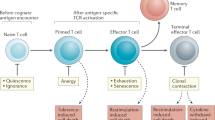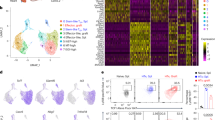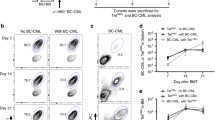Abstract
The mechanisms of allograft tolerance have been classified as deletion, anergy, ignorance and suppression/regulation. Deletion has been implicated in central tolerance1, whereas peripheral tolerance has generally been ascribed to clonal anergy and/or active immunoregulatory states2. Here, we used two distinct systems to assess the requirement for T-cell deletion in peripheral tolerance induction. In mice transgenic for Bcl-xL, T cells were resistant to passive cell death through cytokine withdrawal, whereas T cells from interleukin-2-deficient mice did not undergo activation-induced cell death. Using either agents that block co-stimulatory pathways or the immunosuppressive drug rapamycin, which we have shown here blocks the proliferative component of interleukin-2 signaling but does not inhibit priming for activation-induced cell death, we found that mice with defective passive or active T-cell apoptotic pathways were resistant to induction of transplantation tolerance. Thus, deletion of activated T cells through activation-induced cell death or growth factor withdrawal seems necessary to achieve peripheral tolerance across major histocompatibility complex barriers.
This is a preview of subscription content, access via your institution
Access options
Subscribe to this journal
Receive 12 print issues and online access
$209.00 per year
only $17.42 per issue
Buy this article
- Purchase on Springer Link
- Instant access to full article PDF
Prices may be subject to local taxes which are calculated during checkout



Similar content being viewed by others
References
Sykes, M. & Sachs, D. H. Bone marrow transplantation as a means of inducing tolerance. Semin. Immunol. 2, 401–417 (1990).
Schwartz, R. H. Acquisition of immunologic self-tolerance. Cell 57, 1073–1081 (1989).
Lenschow, D. et al. A. Long-term survival of xenogeneic pancreatic islet grafts induced by CTLA4Ig. Science 257, 789– 792 (1992).
Parker, D.C. et al. Survival of mouse pancreatic islet allografts in recipients treated with allogeneic small lymphocytes and antibody to CD40 ligand. Proc. Natl. Acad. Sci. USA 92, 9560– 9564 (1995).
Larsen, C. P. et al. Long-term acceptance of skin and cardiac allografts after blocking CD40 and CD28 pathways. Nature 381, 434–438 (1996).
Price, D. J., Grove, J. R., Calvo, V., Avruch, J. & Bierer, B. E. Rapamycin-induced inhibition of the 70-kilodalton S6 protein kinase. Science 257, 973– 977 (1992).
Jenkins, M. K. & Schwartz, R. H. Antigen-presentation by chemically modified splenocytes induces antigen-specific T cell unresponsiveness in vitro and in vivo. J. Exp. Med. 165, 302– 319 (1987).
Van Parijs, L. & Abbas, A. K. Homeostasis and self-tolerance in the immune system: turning lymphocytes off. Science 280, 243–248 (1998).
Grillot, D. A., Merino, R. & Nunez, G. Bcl-XL displays restricted distribution during T cell development and inhibits multiple forms of apoptosis but not clonal deletion in transgenic mice. J. Exp. Med. 182, 1973–1983 (1995).
Lenardo, M. J. Interleukin-2 programs mouse alpha beta T lymphocytes for apoptosis. Nature 353, 858–861 ( 1991).
Boise, L.H. et al. CD28 Co-stimulation can promote T cell survival by enhancing the expression of Bcl-xL. Immunity 3, 87–98 (1995).
O'Reilly, L. A., Huang, D. C. & Strasser, A. The cell death inhibitor Bcl-2 and its homologues influence control of cell cycle entry. EMBO J. 15, 6979–6990 (1996).
Murphy, K. M., Heimberger, A. B. & Loh, D. Y. Induction by antigen of intrathymic apoptosis of CD4+CD8+TCRlo thymocytes in vivo. Science 1990, 1720– 1723 (1990).
Gudmundsdottir, H., Wells, A. & Turka, L. Dynamics and requirements of T cell clonal expansion in vivo at the single-cell level: Effector function is linked to proliferative capacity. J. Immunol. 162, 5212– 5223 (1999).
Hancock, W.W. et al. Co-stimulatory function and expression of CD40-ligand, CD80, and CD86 in vascularized murine cardiac allograft rejection. Proc. Natl. Acad. Sci. USA 93, 13967–13972 (1996).
Kneitz, B., Herrmann, T., Yonehara, S. & Schimpl, A. Normal clonal expansion but impaired Fas-mediated cell death and anergy induction in interleukin-2-deficient mice. Eur. J. Immunol. 25 , 2572–2577 (1995).
Wekerle, T. et al. Extrathymic T cell deletion and allogeneic stem cell engraftment induced with co-stimulatory blockade is followed by central T cell tolerance. J. Exp. Med. 187, 2037– 2044 (1998).
Dai, Z., Konieczny, B.T., Baddoura, F.K. & Lakkis, F.G. Impaired alloantigen-mediated T cell apoptosis and failure to induce long-term allograft survival in IL-2-deficient mice. J. Immunol. 161, 1659–1663 (1998).
Sayegh, M.H. et al. CD28-B7 blockade after alloantigenic challenge in vivo inhibits Th1 cytokines but spares Th2. J. Exp. Med. 181, 1869–1874 (1995).
Tran, H.M. et al. J. Distinct mechanisms for the induction and maintenance of allograft tolerance with CTLA4-Fc treatment. J. Immunol. 159, 2232–2239 (1997).
Waldmann, H. & Cobbold, S. How do monoclonal antibodies induce tolerance? A role for infectious tolerance? Annu. Rev. Immunol. 16, 619–644 ( 1998).
Li, X.C., Zand, M.S., Li, Y., Zheng, X.X. & Strom, T.B. On histocompatibility barriers, Th1 to Th2 immune deviation, and the nature of the allograft responses. J. Immunol. 161, 2241–2247 ( 1998).
Tanchot, C. et al. Modifications of CD8+ T cell function during in vivo memory or tolerance induction. Immunity 8, 581–590 (1998).
Wells, A., Gudmundsdottir, H. & Turka, L. Following the fate of individual T cells throughout activation and clonal expansion: signals from T cell receptor and CD28 differentially regulate the induction and duration of a proliferative response. J. Clin. Invest. 100, 3173–3183 (1997).
Acknowledgements
This work was supported by the National Kidney Foundation of America (X.C.L.), the Juvenile Diabetes Foundation (X.X.Z., T.B.S., M.H.S. and L.A.T.), the American Heart Association (L.A.T.) and the National Institutes of Health (AI-34665, AI-37691, AI-37798, AI-41521, AI-42298 and CA09140).
Author information
Authors and Affiliations
Corresponding authors
Rights and permissions
About this article
Cite this article
Wells, A., Li, X., Li, Y. et al. Requirement for T-cell apoptosis in the induction of peripheral transplantation tolerance. Nat Med 5, 1303–1307 (1999). https://doi.org/10.1038/15260
Received:
Accepted:
Issue Date:
DOI: https://doi.org/10.1038/15260
This article is cited by
-
Sterile inflammation in thoracic transplantation
Cellular and Molecular Life Sciences (2021)
-
Long-term tolerance of islet allografts in nonhuman primates induced by apoptotic donor leukocytes
Nature Communications (2019)
-
T cell co-stimulation and co-inhibition in cardiovascular disease: a double-edged sword
Nature Reviews Cardiology (2019)
-
Apoptotic cell-linked immunoregulation: implications for promoting immune tolerance in transplantation
Cell & Bioscience (2015)
-
Post-transplantation malignancies: here today, gone tomorrow?
Nature Reviews Clinical Oncology (2015)



